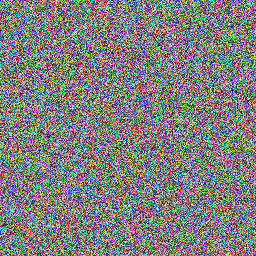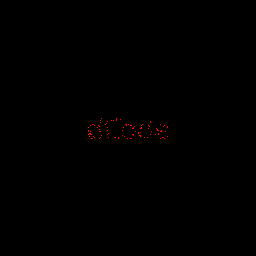Tool to detect if pixels are fully or not completely filled with randomness in an image from statistical measurements of color variations inside the whole picture.
Image with Random Pixels - dCode
Tag(s) : Image Processing
dCode is free and its tools are a valuable help in games, maths, geocaching, puzzles and problems to solve every day!
A suggestion ? a feedback ? a bug ? an idea ? Write to dCode!
Image with Random Pixels
Randomness Detector
Answers to Questions (FAQ)
What is a random pixels image?
A random image is an image in which the pixels are chosen at random, so they can take any color from the desired palette (generally 16 million colors). The resulting images look like multi-colored noise background.
How to detect randomness in a randomized image?
A perfectly random image will have ideally distributed colors (about as much green hue as blue or red, and about as many bright colors as grayish colors), any variation in the average values over a given area tends to indicate non-random values.
The human eye and brain cannot detect small variations in random noise, only computer image analysis can.
Source code
dCode retains ownership of the "Image with Random Pixels" source code. Any algorithm for the "Image with Random Pixels" algorithm, applet or snippet or script (converter, solver, encryption / decryption, encoding / decoding, ciphering / deciphering, breaker, translator), or any "Image with Random Pixels" functions (calculate, convert, solve, decrypt / encrypt, decipher / cipher, decode / encode, translate) written in any informatic language (Python, Java, PHP, C#, Javascript, Matlab, etc.) or any database download or API access for "Image with Random Pixels" or any other element are not public (except explicit open source licence). Same with the download for offline use on PC, mobile, tablet, iPhone or Android app.
Reminder: dCode is an educational and teaching resource, accessible online for free and for everyone.
Cite dCode
The content of the page "Image with Random Pixels" and its results may be freely copied and reused, including for commercial purposes, provided that dCode.fr is cited as the source (Creative Commons CC-BY free distribution license).
Exporting the results is free and can be done simply by clicking on the export icons ⤓ (.csv or .txt format) or ⧉ (copy and paste).
To cite dCode.fr on another website, use the link:
In a scientific article or book, the recommended bibliographic citation is: Image with Random Pixels on dCode.fr [online website], retrieved on 2025-12-28,


